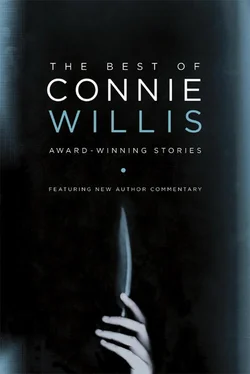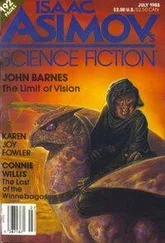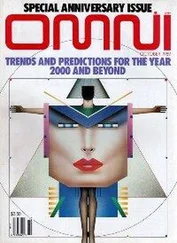“Why do people go to zoos?”
She was good, I had to give her that. And fast. She spat out answers as fast as I could ask her questions about the Sun and The Smart Set and William Jennings Bryan.
“Why did you go to Dayton?”
“To see a three-ring circus. And stir up the animals.”
“What did you take with you?”
“A typewriter and four quarts of Scotch. I should have taken a fan. It was hotter than the seventh circle of hell, with the same company.”
“What did you eat while you were there?” Kildy asked.
“Fried chicken and tomatoes. At every meal. Even breakfast.”
I handed him the bogus evangelist handbill Mencken had handed out at the Scopes trial. “What’s this?”
She looked at it, turned it over, looked at the other side. “It appears to be some sort of circular.”
And there’s all the proof we need, I thought smugly. Mencken would have recognized that instantly. “Do you know who wrote this handbill?” I started to ask and thought better of it. The question itself might give the answer away. And better not use the word “handbill.”
“Do you know the event this circular describes?” I asked instead.
“I’m afraid I can’t answer that,” she said.
Then you’re not Mencken, I thought. I shot a triumphant glance at Kildy.
“But I would be glad to,” Ariaura said, “if you would be so good as to read what is written on it to me.”
She handed the handbill back to me, and I stood there looking at it and then at her and then at it again.
“What is it, Rob?” Kildy said. “What’s wrong?”
“Nothing,” I said. “Never mind about the circular. What was your first published news story about?”
“A stolen horse and buggy,” she said, and proceeded to tell the whole story, but I wasn’t listening.
He didn’t know what the handbill was about, I thought, because he couldn’t read. Because he’d had an aphasic stroke in 1948 that had left him unable to read and write.
I had a nice clean place to stay, madam, and I left it to come here.
—INHERIT THE WIND
“It doesn’t prove anything,” I told Kildy after Ariaura was gone. She’d come out of her Mencken act abruptly after I’d asked her what street she lived on in Baltimore, looked bewilderedly at me and then Kildy, and bolted without a word. “Ariaura could have found out about Mencken’s stroke the same way I did,” I said, “by reading it in a book.”
“Then why did you go white like that?” Kildy said. “I thought you were going to pass out. And why wouldn’t she just answer the question? She knew the answers to all the others.”
“Probably she didn’t know that one and that was her fallback response,” I said. “It caught me off guard, that’s all. I was expecting her to have memorized pat answers, not—”
“Exactly,” Kildy cut in. “Somebody faking it would have said they had an aphasic stroke if you asked them a direct question about it, but they wouldn’t have… and that wasn’t the only instance. When you asked him about the Baltimore fire, he said it was the best time he’d ever had. Someone faking it would have told you what buildings burned or how horrible it was.”
And he’d said, not “1904” or “oh-four,” but “aught-four.” Nobody talked like that nowadays, and it wasn’t something that would have been in Mencken’s writings. It was something people said, not wrote, and Ariaura couldn’t possibly—
“It doesn’t prove he’s Mencken,” I said and realized I was saying “he.” And shouting.
I lowered my voice. “It’s a very clever trick, that’s all. And just because we don’t know how the trick’s being done doesn’t mean it’s not a trick. She could have been coached in the part, including telling her how to pretend she can’t read if she’s confronted with anything written. Or she could be hooked up to somebody with a computer.”
“I looked. She wasn’t wearing an earpiece, and if somebody was looking up the answers and feeding them to her, she’d be slower answering them, wouldn’t she?”
“Not necessarily. She might have a photographic memory.”
“But then wouldn’t she be doing a mind-reading act instead of channeling?”
“Maybe she did. We don’t know what she was doing before Salem,” I said, but Kildy was right. Someone with a photographic memory could make a killing as a fortune-teller or a medium, and there were no signs of a photographic memory in Ariaura’s channeling act—she spoke only in generalities.
“Or she might be coming up with the answers some other way,” I said.
“What if she isn’t, Rob? What if she’s really channeling the spirit of Mencken?”
“Kildy, channels are fakes. There are no spirits, no sympathetic vibrations, there’s no astral plane.”
“I know,” she said, “but his answers were so—” She shook her head. “And there’s something about him, his voice and the way he moves—”
“It’s called acting.”
“But Ariaura’s a terrible actress. You saw her do Isus.”
“All right,” I said. “Let’s suppose for a minute it is Mencken, and that instead of being in the family plot in Loudon Park Cemetery, his spirit’s floating in the ether somewhere, why would he come back at this particular moment? Why didn’t he come back when Uri Geller was bending spoons all over the place, or when Shirley MacLaine was on every talk show in the universe? Why didn’t he come back in the fifties when Virginia Tighe was claiming to be Bridey Murphy?”
“I don’t know,” Kildy admitted.
“And why would he choose to make his appearance through the ‘channel’ of a third-rate mountebank like Ariaura? He hated charlatans like her.”
“Maybe that’s why he came back, because people like her are still around and he hadn’t finished what he set out to do. You heard him—he said he left too early.”
“He was talking about the Scopes trial.”
“Maybe not. You heard him, he said, ‘You let the quacks and the crooks take over.’ Or maybe—” she stopped.
“Maybe what?”
“Maybe he came back to help you, Rob. That time you were so frustrated over Charles Fred, I heard you say, ‘Where the hell is H. L. Mencken when we need him?’ Maybe he heard you.”
“And decided to come all the way back from an astral plane that doesn’t exist to help a skeptic nobody’s ever heard of.”
“It’s not that inconceivable that someone would be interested in you,” Kildy said. “I… I mean, the work you’re doing is really important, and Mencken—”
“Kildy,” I said, “I don’t believe this.”
“I don’t, either—I just… you have to admit, it’s a very convincing illusion.”
“Yes, so was the Fox sisters’ table-rapping and Virginia Tighe’s past life as an Irish washerwoman in 1880s Dublin, but there was a logical explanation for both of them, and it may not even be that complicated. The details Bridey Murphy knew all turned out to have come from Virginia Tighe’s Irish nanny. The Fox sisters were cracking their toes , for God’s sake.”
“You’re right,” Kildy said, but she didn’t sound completely convinced, and that worried me. If Ariaura’s Mencken imitation could fool Kildy, it could fool anybody, and “I’m sure it’s a trick. I just don’t know how she’s doing it” wasn’t going to cut it when the networks called me for a statement. I had to figure this out fast.
“Ariaura has to be getting her information about Mencken from someplace,” I said. “We need to find out where. We need to check with bookstores and the library. And the Internet,” I said, hoping that wasn’t what she was using. It would take forever to find out what sites she’d visited.
Читать дальше












